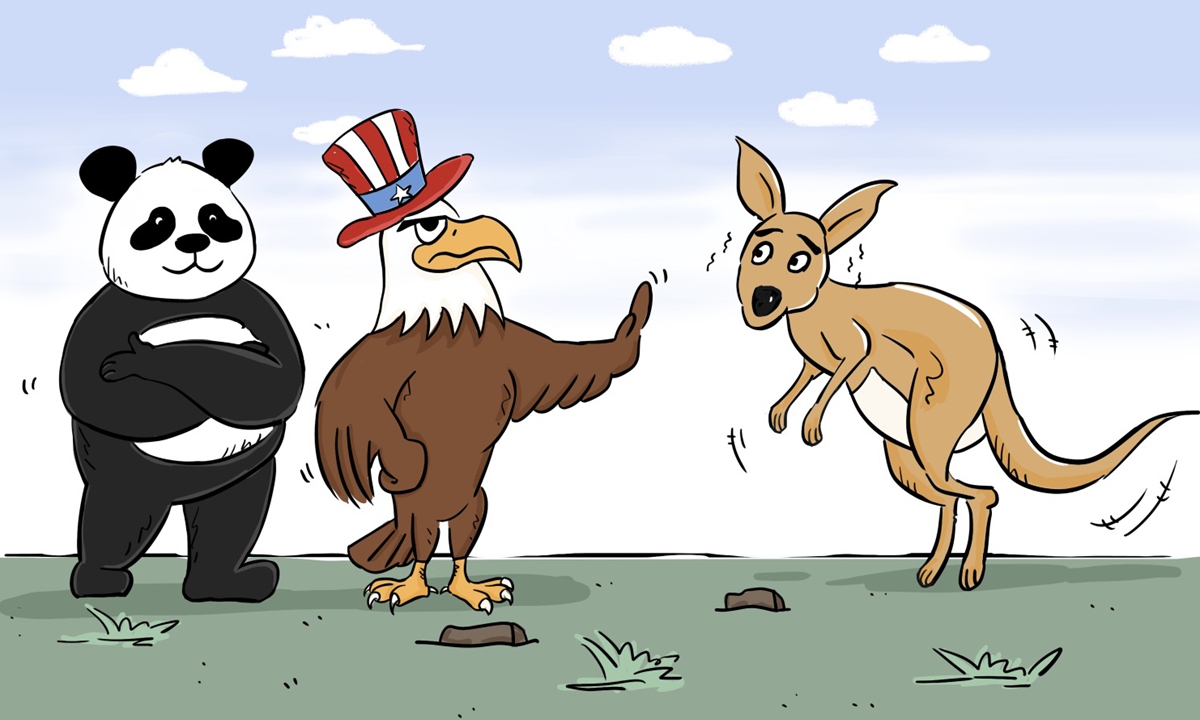AUSMIN shows Australia's China policy different to US'
By James Laurenceson Source: Global Times Published: 2020/8/4 20:23:40

Illustration: Chen Xia/GT
Amid tensions with the US and Australia, China has accused the two countries of "smearing China on a series of issues" and told them to "stop interfering in China's internal affairs or damaging Chinese interests."
The Chinese Embassy in Canberra also joined in to "firmly reject and oppose those unfounded accusations and attacks against China."
Yet one wonders whether the Chinese government's "eyes and ears" abroad also noticed the clear differences in American and Australian attitudes and intent.
China hawks in Washington and Canberra had plenty of reasons to be excited in the lead-up to the AUSMIN consultations on July 28.
Almost immediately after the two countries had released a joint statement, which pushed back against China on developments in the South China Sea, Hong Kong, and Xinjiang, among other issues, the Chinese Ministry of Foreign Affairs made its unhappiness plain.
The Australia-China relationship at the official level has been tense since 2017 and has sunk to new lows this year.
US Secretary of State Mike Pompeo gave a thundering speech that framed his country's disputes with China in stark ideological terms. He said that other countries needed to choose which side they were on, "The division is between freedom and tyranny. I think that's the decision that we're asking each of these nations to make."
And to top things off, rather than join by video link, the two senior ministers in Australia's Scott Morrison-led government had agreed to fly to the US, a global COVID-19 hot spot, reportedly at the request of Trump administration officials.
Yet any notion that the Australians had traveled half way around the world because the country was a US lapdog was shattered in the subsequent joint press conference.
Pompeo led off, homing in on the Communist Party of China (CPC), singling it out for criticism no less than six times in a brief opening statement. He also sought to link the AUSMIN discussions back to his fiery speech a week earlier.
Australia's Payne was up next. If Pompeo was expecting a ringing endorsement, he would have been disappointed. She didn't mention the CPC at all, although was not shy in drawing attention to what Canberra sees as overreach by Beijing that encroaches on Australia's interests.
Pompeo used the first question to again hark back to his "alliance of democracies" speech.
Payne took the opportunity to respond diplomatically, but brutally: "The Secretary's speeches are his own - Australia's positions are our own."
She elaborated further: "Most importantly from our perspective, we make our own decisions, our own judgments in the Australian national interest… So, we deal with China in the same way. We have strong economic engagement, other engagement, and it works in the interests of both countries."
And punctuating the point: "The relationship that we have with China is important, and we have no intention of injuring it, but nor do we intend to do things that are contrary to our interests."
To be sure, looking on at the AUSMIN meetings it wouldn't be hard for commentators in China to find evidence that confirmed pre-existing views they had about Australian subservience to the US.
And there are certainly some vocal members of the Morrison government that would happily follow the US into a cold war with China.
But an accurate appraisal would admit that pragmatism rather than ideology remains the principle frame through which the key decision-makers in Australia's government view the China relationship.
How could they not?
On Friday, the Australian Bureau of Statistics released new data showing that China had accounted for an extraordinary 46 percent of the country's total goods exports in June 2020.
And turning to key Australian services exports like education, while COVID-19 was wreaking havoc generally, student visa applications from China in 2019-2020 were only down 20 percent on a year earlier, while those from the second-largest customer, India, slumped by nearly half.
From Australia's perspective, the relationship with China is also about much more than just trade in iron ore, education and manufactured goods.
A new report published by the Australia-China Relations Institute at the University of Technology Sydney documents that China is now also Australia's No.1 partner in producing scientific research publications.
Meanwhile, the Chief Executive Officer of the United States Studies Centre in Sydney said in May that some "Washington insiders openly worry whether Australia is, or soon will be, a lost cause," provocatively asking "Who lost Australia?"
Here's what Beijing really needs to know.
Shortly after Scott Morrison became prime minister in August 2018, he said that he would "try to take a similar approach" to John Howard, Australia's prime minister from 1996 to 2007, in managing Australia's relationships with the US and China. And toward China, Howard's approach was distinguished by pragmatism, not ideology.
Earlier this month, Howard admitted that in recent years China had become a harder partner for Australia to work with. But his advice to the current prime minister wasn't to line up with America in an anti-China bloc. Rather, he said Australia should "continue to toil away at keeping the bilateral relationship together. It's very important we don't give up a practical relationship with China."
The key challenge in addressing the current tensions in the Australia-China relationship isn't about what America wants. It's whether China is willing to pick up the phone when Australia calls.
The author is director of the Australia-China Relations Institute at the University of Technology Sydney. opinion@globaltimes.com.cn
Posted in: ASIAN REVIEW,OTHER REGIONS